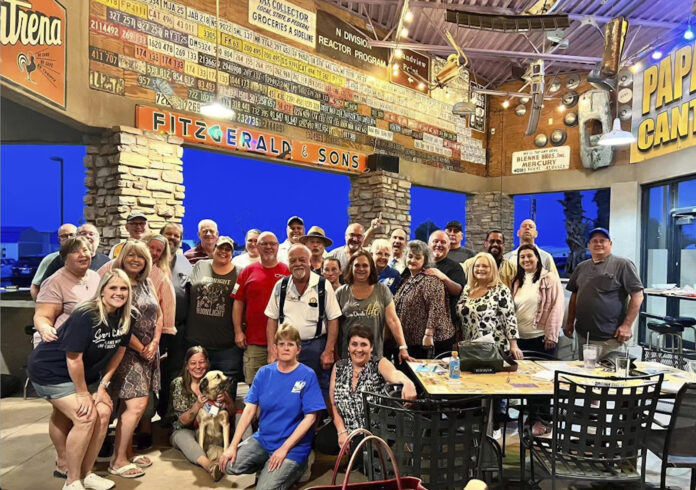
When Stan and Julie Hayes moved to Maricopa from flat and humid Indiana, they were excited to launch a nonprofit service organization in their new hometown.
“Maricopa Moose is about bringing the community together,” Julie said. “It can be hard to meet people out here compared to our home state, so this gives everyone a chance to meet others and establish bonds.”
While the couple found a large community wanting to connect with Maricopa Moose, a local chapter of Moose International, the last thing they expected was difficulty renting a space in the city.
Stan said renting city-owned space, like in the library or at Copper Sky, is exorbitantly costly for a fledgling organization. Costs ranged from $47 per hour for a small room at the library to nearly $1,200 for a social event.
“I understand the city needs to make money, but we felt like we were being bled dry as a nonprofit,” he said.
In that last instance, Maricopa Moose wanted to host a 50-person social event with alcohol and settled on Copper Sky as a venue. The couple received a quote for $220 for the four-hour event, which felt reasonable, Stan said.
That changed the next day when they received an updated quote for nearly $1,200. This included a space upgrade he did not request, as well as an alcohol permit, an hourly fee for an on-site uniformed officer and a request for insurance.
After holding a planning meeting at the library, Stan said he opted instead to host the social event in his backyard — for free.
“It all just left a bad taste in our mouth with how the city handles things,” he said.
Maricopa Moose is not the only group feeling priced out of city facilities.
Multiple organizations spoke with InMaricopa about their experiences, especially in having to move events to other locations or scramble to figure out how to cover the cost.
In fact, even after the city council approved a resolution for changes to rental fees on Oct. 2, that still didn’t change plans for some. Even the 7th annual Senior Information Expo was priced out; they moved their 2024 event from Copper Sky to the city library for cost purposes.
‘It’s cost prohibitive’
For the second time this year, the city contemplated adjusting facility rental rates, which had some residents questioning whether they could afford to rent the spaces they paid for.
Even Councilmember Vincent Manfredi noted room costs were high. During a City Council work session on July 25, he shared how much renting space in the library cost him for a job fair he hosted for his business.
“I rented three rooms at the library that lasted five hours,” he said. “That cost me $800-$900.”
Peg Chapados, committee chair of the Cultural Affairs and Arts Committee, said she has heard murmurs from residents and groups about the price of rental spaces around the city.
“There’s a lot of groups that just want to meet, talk and brainstorm,” she said. “They don’t want to host events. (The city) needs to get that worked out because right now it’s cost prohibitive for most groups.”
Susan Cameron, a local painter and president of the Maricopa Friends of the Arts, agreed.
“People are finding other places to go to and not using the library at all,” Cameron said.
InMaricopa spoke with a handful of other representatives of various groups in the city. All came to the same conclusion: Maricopa government makes it difficult to host events in city facilities.
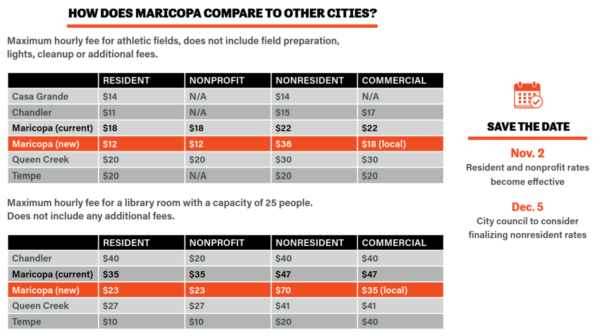
‘We have to pay through the nose’
Many groups have opted to move meetings to other locations. Hayes said Maricopa Moose began hosting regular meetings at Northern Lights Therapy, where event space can cost less than $50 for an evening.
Maricopa Friends of the Arts moved its September fundraiser from the library to Global Water, according to Cameron.
“We have to pay through the nose to have an event,” she said. “We looked into the library, but it would have cost over $1,000 for the atrium and another room for food. We went to Global Water and were able to have the space donated.”
It was a constant battle for Cameron to find affordable space, and it left her feeling numb to renting from the city again.
“We’re basically just moving away from it, and I don’t mind,” she said. “I used to get angry, but I’m just wasting my energy when I could use it to help artists. Eventually, all those rooms will be empty all the time because people won’t be paying to use them.”
‘We lost the support of the city’
Jaime Harrison of Relay for Life of Maricopa, a fundraiser to help communities fight cancer and the only such event in Pinal County, said while operating costs over the last 13 years have fluctuated, they have now become unreasonable.
“This year, since the city has changed how they’re doing their pricing, it has skyrocketed,” she said.
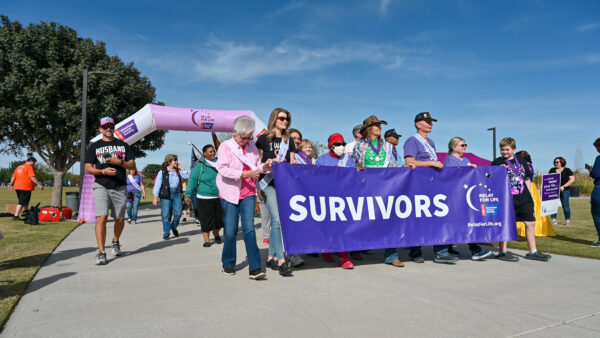
For its upcoming five-hour event on Nov. 4, the group will pay $3,650, even after dropping some rooms and other amenities.
“We can’t afford to do anything else, even after we shortened the length of our event time,” Harrison said. “None of us make any money on the event. Every penny not directly donated to the American Cancer Society is spent running the event.”
The organization hesitated to approve the event because of the high cost, Harrison added.
“This year, we had to convince ACS that we would be able to raise enough money to donate funds and cover operational costs,” she said. “Based on the amount of money we’re spending to rent Copper Sky this year, we need to raise over $100,000. Last year, we raised a little over $23,000.”
“It’s hard, because we worked very hard to get our community involved. It feels like the city is making money off our nonprofit,” she added. “I just feel like we lost the support of the city we used to have and in the end it’s harder on everybody.”
Rental rate changes
It seems the city is well aware of the complaints.
On June 6, Maricopa City Council heard a presentation from the city manager’s office about a proposed adjustment to facility rental rates and policy changes. This included revising the fee structure to reflect different rates for local businesses, residents and non-residents.
Shane Stone, then-assistant to the city manager said during the meeting the new fee proposal stemmed from an effort to make spaces cost-effective.
“We really want to make sure that facilities are available to our community and available to organizations that serve our community as well, without being overburdensome in cost while also being protected for use for years to come,” he said.
The issue was brought up again during a July 26 work session and finally during a Sep. 19 council meeting. During both, the public and Mayor Nancy Smith reiterated how current costs have dissuaded some residents from using city facilities.
“I have heard from 100-200 different residents that have tried to reserve a room at the library, tried to reserve a ramada, tried to reserve various locations the city has,” she said during the work session. “They just can’t afford it. And the same is true for the nonprofits.”
After a myriad of changes, the city decided prices would follow a revised fee structure, starting with a base rate for local businesses effective immediately. From there, residents and nonprofits would see a 35% discount from that base rate, while fees for non-residents would increase 200%.
According to a press release issued Oct. 5, the residential and nonprofit rates would be effective Nov. 2. The non-resident fees, meanwhile, will be subject to a 60-day posting period, after which the city council will finalize during a Dec. 5 meeting.
In one example, renting both the Redwood A and B rooms at the library currently run a resident $130 per hour, while non-residents pay $173 per hour. Under the revised rate structure, local businesses pay $130, residents and nonprofits will pay $85 and non-residents will pay $260, all hourly fees.
This results in a $45 per hour discount for residents and nonprofits, something the city said would “help support local initiatives and community-driven projects.”
But is it enough?
When it comes down to it, though, most community organizations felt left out of the process.
Chapados said that while 35% was “a very generous discount,” city officials did not reach out to the nonprofit community about facility usage and pricing recommendations.
“You can’t publicly say you support arts, seniors and community groups, then turn around and make it cost prohibitive,” she said. “Unfortunately, they’ve discouraged any nonprofit and recreation group from being able to meet at any city facility. Maricopa doesn’t have a lot of public spaces right now and they keep putting roadblocks in the way.”
Cameron with Maricopa Friends of the Arts said that even with the price reduction, her organization feels stuck with where to host board and planning meetings.
“I feel like we don’t have a choice, we’re going to have to follow the price schedule,” she said. “It doesn’t feel good to take money out of the funds that’s supposed to go to grants and artist opportunities.”
When asked what the group plans to do in the future, Cameron said they just have to remain hopeful.
“We’re just going to do what we can,” she said. “Either that, or we’ll start meeting at McDonald’s or something.”
Fielding a complaint
It’s not just the cost of meeting spaces that has upset organizations. It’s fields, too.
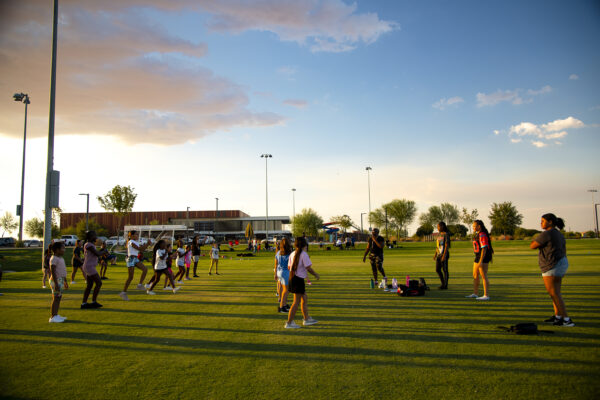
Of course, there are other expenses: uniforms, drinks, snacks and admission to other facilities.
“We definitely try to save where we can when it comes to renting facilities,” she said, adding the nonprofit tries to limit the length of practice to avoid the cost of lighting fields at night. “It gets extremely expensive and it’s difficult on organizations like ours.”
Few other local options exist for hosting football or cheer practice. Local schools rent their facilities, but they aren’t always feasible options for the Pumas’ four-day practice week.
“It’s actually really frustrating,” Lendsey said. “We’re providing a service for the city and for parents who want to find extracurricular activities for their kids. The facilities are paid for by the residents. We just want to feel supported.”
A revised rental policy under consideration by City Council would decrease rental fees for multipurpose fields at Copper Sky to $9 per field per hour, reducing the Pumas’ weekly field costs by $48, not considering the lights.
Editor’s note: Vincent Manfredi is an owner of InMaricopa.
The November edition of InMaricopa Magazine is in Maricopa mailboxes and available online.



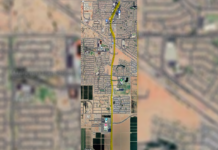


![In mayoral race, it’s the Nancy Smith show Maricopa Chamber of Commerce Executive Director Kelly Anderson grills incumbent Mayor Nancy Smith in election's first campaign event April 30, 2024, at Southern Dunes Golf Club. [Elias Weiss]](https://www.inmaricopa.com/wp-content/uploads/2024/04/CRM_1009-218x150.jpg)
![Merging lanes incite more 347 anger A merging lane sign sits on the side of State Route 347 northbound lanes during evening traffic on April 30, 2024. [Monica D. Spencer]](https://www.inmaricopa.com/wp-content/uploads/2024/04/spencer-043024-adot-merging-lanes-347-web-218x150.jpg)



![City gave new manager big low-interest home loan City Manager Ben Bitter speaks during a Chamber of Commerce event at Global Water Resources on April 11, 2024. Bitter discussed the current state of economic development in Maricopa, as well as hinting at lowering property tax rates again. [Monica D. Spencer]](https://www.inmaricopa.com/wp-content/uploads/2024/04/spencer-041124-ben-bitter-chamber-property-taxes-web-218x150.jpg)





